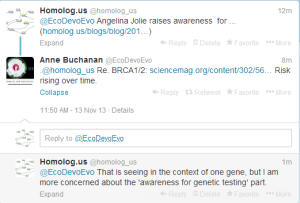
What if Angelina Jolie Were Simply Wrong
ABC News reports -

Jolie’s Doctor Says Her Story Raises Awareness, Saves Lives
Angelina Jolie raised global awareness of breast cancer, genetic testing and pre-emptive medical procedures when she revealed her decision to have a double mastectomy five months ago. Now her surgeon says that by going public with her ordeal, the actress has saved lives.
“I’m seeing in my practice already women who are saying, ‘I was inspired by that to get gene testing,’” said Dr. Jay Orringer, the Beverly Hills, Calif., surgeon who performed Jolie’s breast reconstruction, in an interview with the New York Daily News this past weekend. “I think it’s going to have a tremendously lasting impact.”
The National Society of Genetic Counselors did indeed notice an immediate “Jolie Effect” as soon as the actress publicly revealed her medical situation.
On the day Jolie’s op-ed about her decision and treatment appeared in The New York Times, visits to the society’s “Find a Genetic Counselor” online tool jumped by 86 percent, according to the society, and Cancer.gov’s Preventive Mastectomy Fact Sheet, which typically receives fewer than 200 page views per day, according to the organization, jumped to more than 69,000 page views.
Today’s commentary at ecodevoevo blog titled “When causal disease alleles don’t cause disease (or is that the norm?)” presents an opposite picture of reality. The discussion is based on a paper published in Nature Genetics this month. The authors looked for seven genes that have been well-established to be associated with a hereditary form of diabetes called MODY (maturity-onset diabetes of the young). They sequenced 4,003 individuals in two studies and -
found that 1.5% of one group and 0.5% of the other carry ‘disease-causing mutations’, but with no evidence of disease. These were individuals well past the MODY age of onset, so it’s unlikely that their apparent genetic risk will lead to disease.
A number of similar studies are coming out and ecodevoevo blog summarized their findings as follows.
There have by now been several extensive-sequencing papers that have found that we all are walking around with many (estimates are, as we recall, about 150) seriously mutated or defunct genes that otherwise should be associated with disease – that we don’t have.
It seems like preemptively ‘treating’ people for diseases they will never have in the future not the brightest idea after all.
-——————————————————–
Edit.
An informative exchange with @ecodevoevo, who pointed out that the risk of BRCA1/2 is rising over time.

BREAST AND OVARIAN CANCER RISKS DUE TO INHERITED MUTATIONS IN BRCA1 AND BRCA2
Risks of breast and ovarian cancer were determined for Ashkenazi Jewish women with inherited mutations in the tumor suppressor genes BRCA1 and BRCA2. We selected 1008 index cases, regardless of family history of cancer, and carried out molecular analysis across entire families. The lifetime risk of breast cancer among female mutation carriers was 82%, similar to risks in families with many cases. Risks appear to be increasing with time: Breast cancer risk by age 50 among mutation carriers born before 1940 was 24%, but among those born after 1940 it was 67%. Lifetime risks of ovarian cancer were 54% for BRCA1 and 23% for BRCA2 mutation carriers. Physical exercise and lack of obesity in adolescence were associated with significantly delayed breast cancer onset.